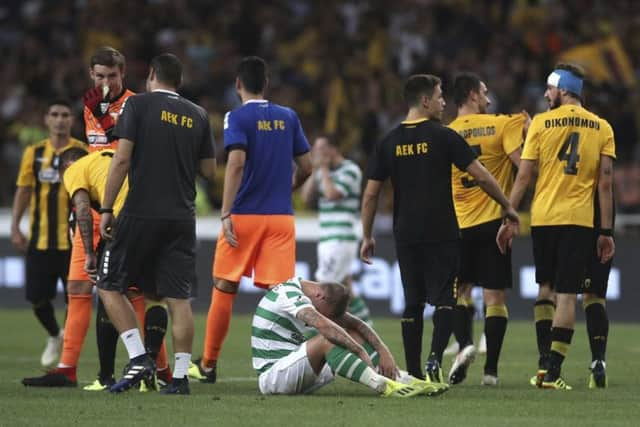Celtic: Counting the cost of failure in Champions League
In itself, failure to make it three consecutive appearances in the group stage of the Champions League is hardly the biggest black mark to be placed on the CV of a coach who has undeniably re-energised and transformed Celtic since his arrival in the summer of 2016.
The labyrinthine and now longer qualifying path in Uefa’s elite tournament is inevitably littered by casualties among the higher profile clubs from Europe’s lower-ranked nations. Celtic are already joined in being eliminated this season, for example, by Spartak Moscow and Basel.
Advertisement
Hide AdAdvertisement
Hide AdSo, as a general ratio of making it to the group stage, two out of three ain’t bad for Celtic. But it is the manner of their exit and circumstances surrounding it which understandably stick in the throats of their disgruntled support this week.


It is impossible to avoid the conclusion that the 3-2 aggregate defeat by AEK Athens could so easily have been avoided, while Celtic’s frustration can only be compounded by the knowledge they would have faced an eminently winnable play-off round tie against Hungarian champions Videoton.
The Scottish champions are now paying a heavy price for the largely underwhelming and ineffective business they have conducted in the last two transfer windows. Rodgers, for all of the increasing irritation he has been displaying towards the club’s now well-established recruitment strategy, must take his share of a collective responsibility for the lack of success in adequately reinforcing and strengthening the first-team squad.
The glaring deficiencies in central defence, which undermined Celtic so painfully in the 2-1 defeat by AEK in Greece on Tuesday night, have been a long-standing issue during Rodgers’ tenure. The signing of former German international Marvin Compper in January, on a two-and-a-half-year contract, has been an unmitigated calamity with the injury-prone 33-year-old so far seeing just 83 minutes of competitive action for the club in a Scottish Cup tie against Morton five months ago. With Kristoffer Ajer’s suspension this week, the lack of central defensive resources reached a perfect storm with Dedryck Boyata’s refusal to travel to Athens in the wake of Celtic rejecting a £9 million bid from Fulham for the Belgian international.
With Sevilla and Lazio both reported to be interested in Boyata, his sale before the end of this month will now be desirable for all parties. From Celtic’s perspective, it will also compensate for some of the revenue they will now miss out on in Europe over the coming campaign. Record prize money is on offer in the Champions League this season with £13.35m guaranteed simply for making it to the group stage. Further incentives of £2.36m for each win in the group stage and £800,000 for every draw, along with a sizeable chunk of improved broadcasting rights, could have enabled Celtic to bank in excess of £30m.
Instead, they will target a competitive run in the Europa League where, although the financial rewards have also been significantly increased this season, they remain small beer by comparison. Group stage participation will guarantee a minimum of £2.61m, with £508,000 for every win and £170,000 for every draw in the group stage.
Rodgers, pictured left, will continue working in an environment where higher-quality signings he desires come at a price and wage packet which simply won’t be sanctioned by the Celtic board.
The club’s most recent annual accounts showed revenue increasing by 75 per cent to a record £90.6m on the back of their return to the Champions League group stage under Rodgers. But there was also an increase in operating expenses of more than 33 per cent, to £76.3m, which gives the lie to any notion that Dermot Desmond & Co have been miserly in their backing of the highest paid manager in the club’s history.
Advertisement
Hide AdAdvertisement
Hide AdWith Rangers revitalised by the appointment of Steven Gerrard as manager and financially front-loading their quest to close the gap on their Old Firm rivals, Rodgers may be about to face a significant domestic challenge for the first time since his arrival in Scottish football.
There are two weeks left in the transfer window for Rodgers and Celtic to ensure their first-team squad has a more robust and balanced appearance for the rest of a season in which they remain favourites for the domestic silverware. A lengthy run in the Europa League could also provide balm for the wounds opened up by defeat in Athens. With Celtic likely to face Lithuanian club Suduva in the play-off round, there are echoes from 2002 when Martin O’Neill’s side were eliminated from the Champions League in the third qualifying round by Basel.
Back then, as now, the Celtic fans expressed dismay at the club’s summer recruitment which left them distinctly unimpressed by the signings of Ulrik Laursen from Hibs, David Fernandez from Livingston and Magnus Hedman from Coventry. The board were accused of failing to support O’Neill on the back of his success in reaching the Champions League group stage the previous season.
Those gripes were soon forgotten when Celtic dropped into the Uefa Cup and, starting out with a 10-1 aggregate victory over Suduva, made it all the way to the final in Seville. It might be too much to expect history to repeat itself and Celtic fans are unlikely to be making advance travel plans for the Europa League final in Baku next May.
The absence of the Champions League anthem will be sorely felt at Celtic Park in the coming months. The task now facing Rodgers, and his board of directors, is to ensure it is not the harbinger of a wider or more damaging decline for his team.